OURSCREENINGSERVICESINCLUDE:

•Mammograms
•Clinical Breast Examinations


•Pap Smears
•Ultrasounds: Breast, Abdomen, Pelvic, Obstetric, Doppler, Thyroid
• Biopsies
•Prostate Examinations: DRE (Digital Rectal Examination), PSA (Prostate Specific Antigen)
•Blood Tests
•Consultations
•Fecal Immunochemical Test (FIT) - A new way to test for colon cancer

OURMOBILE CLINICS:
The TTCS also operate Mobile Clinics which provide screening services throughout Trinidad and Tobago.
These mobiles are available by appointment to business institutions for the benefit of their staff and/or sponsored public health fairs.
These are fully equipped to conduct Pap Smears, Clincal Breast Examinations and Prostate Examinations, PSA (Prostate Specific Antigen) testing.
For more information on our screening services orto makean appointment 226.1221 or 800.TTCS I projects@cancer.tt I www.cancertt.com

GET REGULAR CANCER
G E T R E G U L A R C A N C E R S C R E E N I N G .
SCREENING.
Cancer is often unpredictable but there is always something you can do to help reduce your risks. The Trinidad and Tobago Cancer Society recommends and promotes screening for early detection of certain cancers.
is the first step in winning THE FIGHT AGAINST CANCER

Founders
Sherine Mungal
Stuart Fraser
ENVISION, INNOVATE, DELIVER, AND INSPIRE!
With over 30 years of experience, we offer a range of electrical installation services, energy conservation solutions, smart home system designs, and consulting services for all your electrical needs.
In alignment with our culture of sustainability and over a decade of expertise in renewable energy, we provide consulting for solar, wind turbine, hydropower, and hybrid system designs.
Schedule your consultation today, and stay tuned for the launch of our GREEN GADGETS line of products!

Editor-in-Chief
Medical Advisory
Writers
Amira Chenelle Mungal
Dr. Richard Lutchman
Ally Lester
Amira Chenelle Mungal
Brandon Pereira
Christopher Ryde
Kathy Lee
Dr. Richard Lutchman
Sarah Murphy
Sherine Mungal
The U Team
Vince Asher
Creative Director Design
Project Coordinator
Traffic Website Publisher Photography

Stuart Fraser
Nathaniel Pinder
Eidetic Ltd.

Samantha Dhoon
Lorraine Biran
Samantha Dhoon
Shivan Gosine
Eidetic Publishing
Getty Images iStockPhoto
Pexels
Freepik
Shutter Stock
Vecteezy
Unsplash
This information is of a general nature only and is not intended as a substitute for professional health advice and no person should act in reliance on any statement contained in the information provided and at all times should obtain specific advice from a health professional. Eidetic Publishing has made reasonable efforts to ensure that the health information contained herein is accurate and up to date. To the extent permitted by law, Eidetic Publishing, their employees, agents and advertisers accept no liability
(even if negligent) for any injury, loss or damage caused by reliance on any part of this information. U also contains information supplied by third parties. This information is identified with the name of the source and has been chosen for publication because we believe it to be reliable. To the extent permitted by law, Eidetic Publishing, their employees, agents and advertisers accept no liability (even if negligent) for any injury, loss or damage caused by reliance on any part of this information.
EMAIL US contactnichojen@gmail.com
VISIT US www.nichojen.com AT NICHOJEN WE
U The Caribbean Health Digest is published 4 times a year by Eidetic Publishing, Highway Plaza, Level 2, West Wing, LP #80 Calcutta Settlement Road No. 1, Freeport, Trinidad & Tobago. Distribution is handled by Eidetic Limited. Entire contents are copyright. Reproduction in part or whole is prohibited. Eidetic Publishing is in no way affiliated with companies or products covered in U. Produced and printed in Trinidad & Tobago.

Dear Friends,
Something about the way life has become makes you want to shout with praise and gratitude that we made it into another year. But, of course, the pandemic had a lot to do with this, and we have realized how fragile life, relationships, and our simple existence are.
It makes you wonder about so many things, like what stressed us out yesterday may have minimal impact or bearing on us today. Yet, the reality of life and the uncertainty of its conclusion has resonated so distinctly in the last few years, making you want to live differently.

We hope that we at U The Caribbean Health Digest can make even a tiny impact on your health and well-being through our articles and content. We remain dedicated to bringing awareness and education on health issues so that you are more informed about managing your wellness.
We, too, continue to learn something from every issue. We are in awe at some of the content that passes through our desks. Not only by the articles but by the writers who bring them to life and, of course, our Editor-in-Chief, Amira, who pulls it all together under the watchful eye of her medical advisor, Dr. Richard Lutchman.

This cover speaks to so many of us. There have been so many conversations about the subject of obesity globally. But, I have yet to see it dissected in this compelling manner that reaches the core of its many causes as we have here.
Thank you for staying on this journey with us, and we wish you a year filled with health, happiness, and prosperity.
us in saying a whole-hearted farewell to the old and a warmest welcome to the new year, 2023.
Join
Safe and Healthy! SHERINE & STUART FOUNDERS
Stay
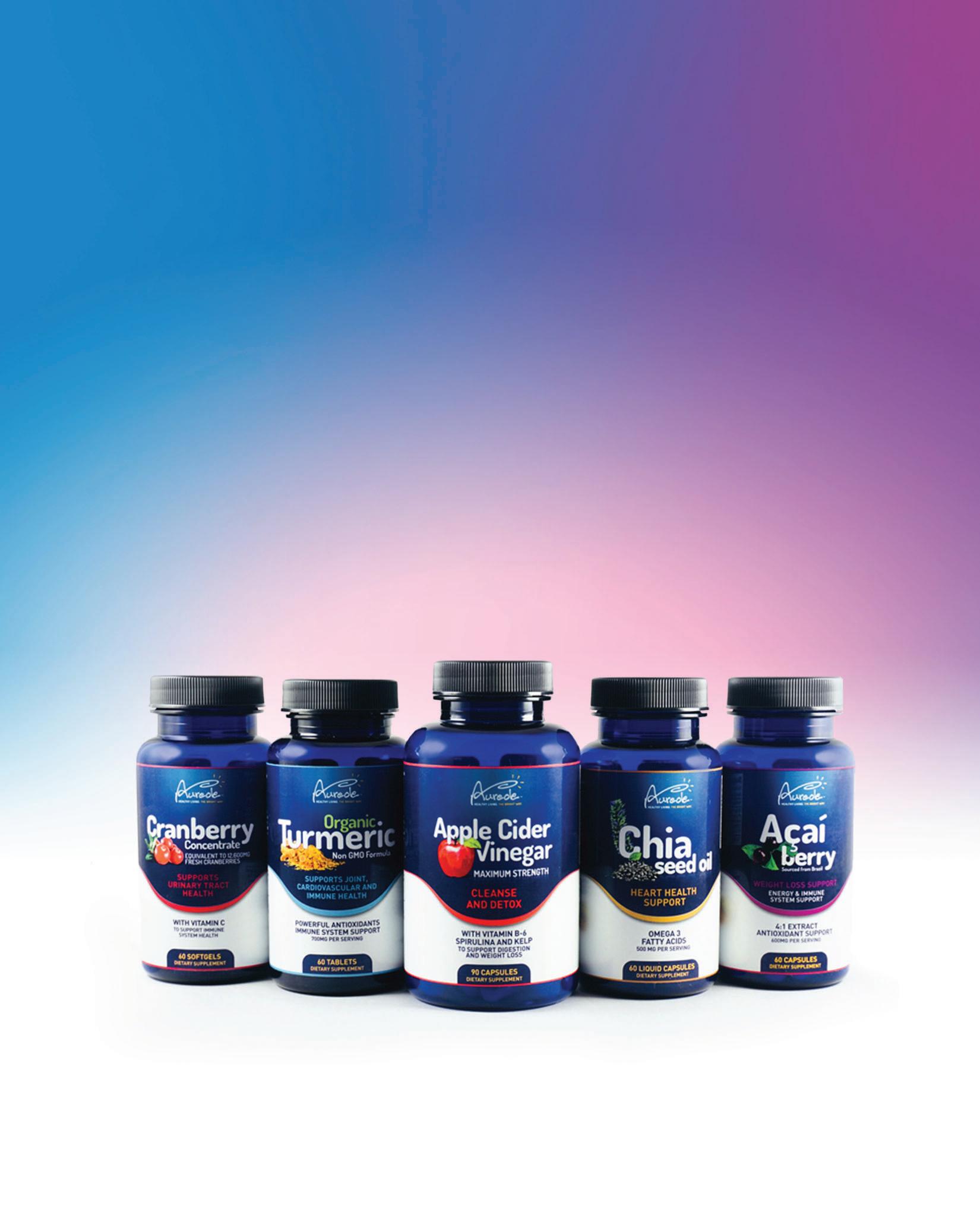





DEAREST READERS, Happy New Year!
Allow me
How exciting it is to enter a new year with our amazing advertisers, team of creatives and subscribers. We also get to welcome new partners and I’ve been checking the data; our list of readers is growing. We are beyond grateful for all of you.
This issue addresses a serious global health issue, the obesity epidemic. We dive into the statistics behind obesity and explain just why the condition requires attention. In addition, we’re providing you with all the health and wellness tips for the start of the new year.
If you’re in Trinidad and Tobago or planning to visit, Carnival is right around the corner. We were strategic with our article choices, as always, and have catered for the ultimate fete-ing season. If you’re not based in Trinidad, these articles are still for you. We’ve included a guide on how to lose weight and build muscle simultaneously (yes, it is possible), an explanation on hunger, and some dental tips. Our mental health section focuses on social anxiety and if you’re wondering how we got to 2023 in the blink of an eye, we have an explanation as to why time is seemingly speeding up. I’ll keep the U Recipes a secret for now.
I offer this issue to you with an abundance of gratitude. It is because of your eagerness and interest that this publication continues to thrive. Without a doubt we’ve created another issue with incredible information that you can benefit from.
We hope you enjoy reading it as much as we enjoyed creating it.
Happy reading!
Till next time, AMIRA CHENELLE MUNGAL EDITOR-IN-CHIEF

to
to you the first issue of U for
present
the year, Issue 45!
The Ultimate Carnival Survival Guide
Jammin’ season is here and Trinidad is ready. This article ensures that you are fully equipped with all the tips and tricks for making the most out of season while remaining safe and healthy.
The Obesity Epidemic
This issue’s feature story brings an explanation on the global obesity crisis and evaluates the causes, implications, and resolution for an improved quality of life.
Building while Burning
You don’t have to lose weight before you can gain muscle. Christopher Ryde, our fitness trainer, guides you on doing both at the same time.
Am I Hungry?
Sometimes we can’t tell if we’re hungry or why we’re hungry after we ate or maybe why we’re not hungry. Hunger has a mind of its own and here we explain it.
Beachy Benefits
Who doesn’t love the beach? The sun, the sand, the water - yes, please! This article discusses all the healthy benefits of a lovely beach day.
What's my teeth saying?
Learn about blue teeth, its signs, symptoms, causes, and treatments.
Food Poisoning
Dr. Richard Lutchman teaches us about food poisoning; what it is, why it occurs and how to manage it. This is an informative piece on when your food doesn’t like you back.
The Social Shivers
Perhaps you prefer staying in because the thought of going out causes panic. This article discusses the mental disorder, social anxiety, and offers coping mechanisms to help you through it.
Figs
Our founder and her fruits! This one is written on figs, not bananas, figs. She brings the benefits, nutritional facts, and her wittiness to us.
Does Time Speed up as we Age?
It certainly feels like time is slipping away, especially as we grow older. But is it actually? This article answers that question.
10 12 18 20 22
24 28 30 34 36
AND IS JAM!

The Ultimate Carnival Survival Guide.



AT U THE CARIBBEAN HEALTH DIGEST OUR TEAM OF CREATIVES ARE 100% TRINI-TO-DE-BONE. IF YOU’RE UNSURE OF WHAT THAT MEANS, ALLOW ME TO EXPLAIN.
FETES, MUSIC, VIBES, A GOOD WINE (NOT THE ALCOHOL); WE ARE SPECIALISTS. IF YOU’RE LOOKING FOR A PARTY, FIND A TRINI.
As you may know, Trinidad and Tobago is known for the greatest street parade in the world. Carnival, the two-day mega festival with the most gorgeous costumes, music, energy, dance, performance, steelpan, and food brings in hundreds of visitors annually.This season of back-to-back fetes requires some safety coaching to gear you up for the non-stop lime.

10 | u TRINIDAD | CARNIVAL PREP
WRITTEN BY THE U TEAM
Here’s the expert advice from our U Team:
1.
Prep Your Body!
We don’t just mean to hit the gym seven days a week to get your body in shape for your costume, prioritize a healthy diet. Nourish your body with vitamins and proteins for the extra strength and stamina you’ll need before you hit the road. If you’re not already on a balanced diet, try kickstarting this at least a few weeks before carnival so your body is fully in order, inside and out.
2.
Stay Hydrated!
It’s important to stay hydrated throughout the season. Drink loads of water and support your local coconut man. Those electrolytes will come in handy for your gym, dance, or recovery session.
3.
Pace Yourself!
The alcohol isn’t going anywhere. Remember, the goal is to have a good time and how is one doing that bent over sideways on the pavement. Plus, a hangover for the following fete? Nah! Avoid mixing drinks. We recommend choosing one drink, sticking to it and drinking water in between.
4.
Mentally Prepare!
Listen to all the latest soca on your way to work or school and back. Get your vibes ready and start practicing the song lyrics because we know you’ll be singing from night till morning.
5.
Rest!
The carnival season is jam-packed with fete after fete and we love to do more than we can handle but, listen to your body. Give yourself time to recuperate between parties and don’t force yourself. The last thing you want is to be yawning in de people fete!
There! We’ve given you a few essential tips for surviving the carnival season. The only thing we can’t prepare you for is the post-carnival blues, also known as, carnival tabanca.
We apologize.

CARNIVAL PREP | TRINIDAD 11 | u
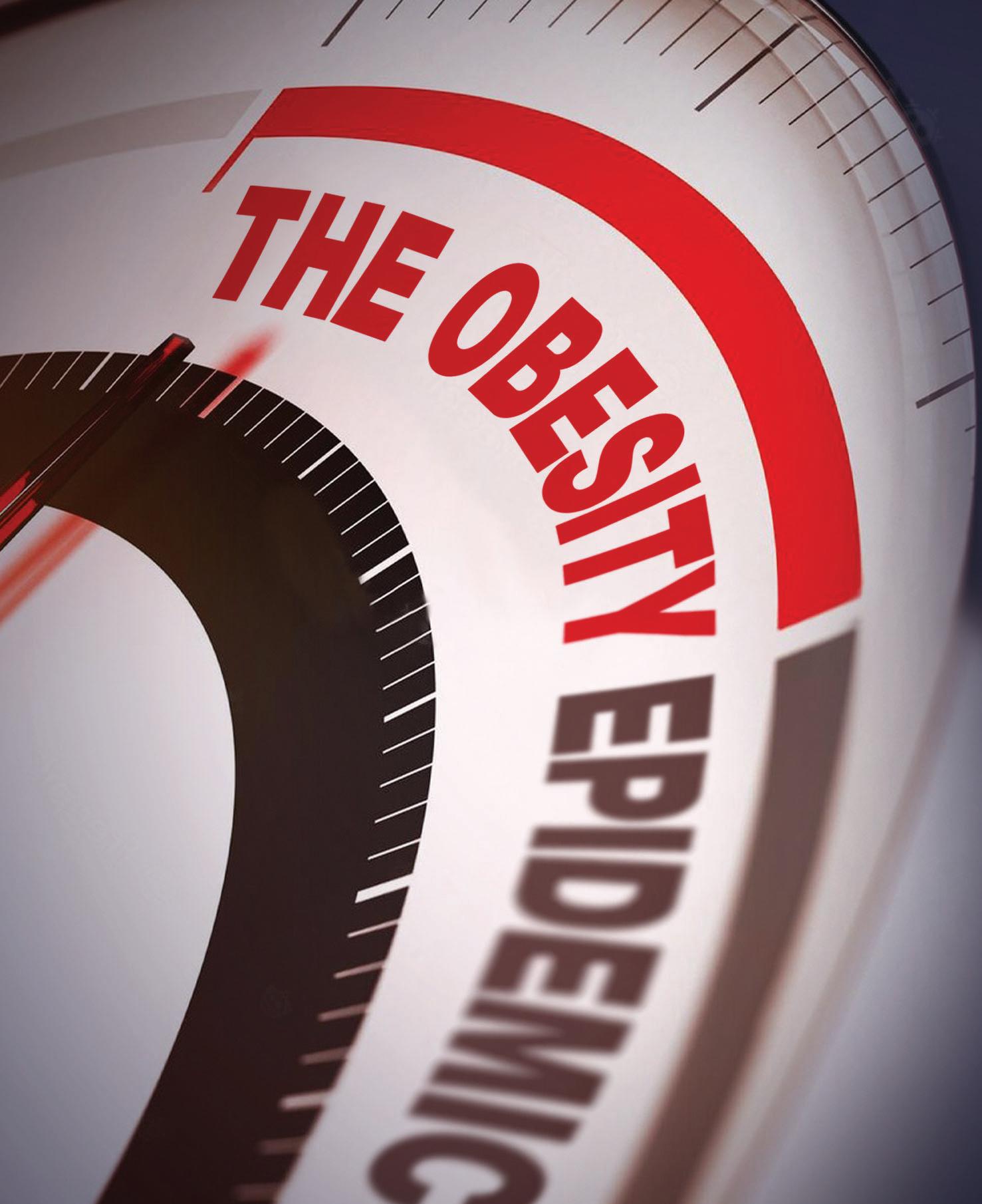
FEATURE | OBESITY 12 | u
WRITTEN BY AMIRA CHENELLE M.
ONE OF THE MOST VISIBLE YET MOST NEGLECTED PUBLIC HEALTH ISSUES. MANY FACTORS, MANY PEOPLE, MANY CAUSES, MANY PLACES, AND A GROWING HEALTH PROBLEM. AFFECTING MORE THAN ONE BILLION PEOPLE WORLDWIDE, THE CONDITION IS CAUSING INJURY TO HEALTH SYSTEMS EVERYWHERE.

THIS IS OBESITY.
OBESITY | FEATURE
13 | u
WHAT IS OBESITY?
Obesity occurs when the body accumulates an excessive amount of body fat. In a more casual expression, we refer to obesity as being overweight but there are differentials based on a body mass index (BMI) scale.
• Global obesity numbers have tripled since 1975.
• More deaths are associated with obesity than being underweight.
Now that you have an understanding of the statistics, you would probably get why some of us refer to it as globesity.
IT’S HEALTH IMPACT
According to clinical studies, obesity causes a reaction to most body systems. It can affect the liver, heart, kidneys, joints, and reproductive system. It can also increase the risk of developing noncommunicable diseases such as diabetes, cardiovascular disease, hypertension, stroke, some forms of cancer and, mental health.
Recent research also recognized that people with obesity are 3x more likely to becoming hospitalized with COVID-19.
Now, let’s face it, many of us are dedicated to living a healthy lifestyle. We strive to maintain our physique by testing out the latest trends on diets and exercise. From keto to hot yoga, we’re doing it for our bodies.
While a lot of us are vested in losing weight to look good, there is a bigger issue at hand, and it’s only getting bigger. Obesity doesn’t just come with the cosmetic concern. Studies have proven, for decades I might add, that obesity is linked to a myriad of health complications and what we’re here to talk about is the causes, implications, and resolution.
A STATISTICAL BREAKDOWN
To paint a not-so-scary-but-scary picture of its impact globally, we’ve broken down some data for you.
• More than one billion people are obese.
• Of the one billion people, 650 million are adults, 340 million are adolescents, and 39 million are children.
• Studies indicate that by 2025, 167 million people will suffer health complications as a result of obesity.
Its impact is no joke. Think for a second; if we can eliminate the worry behind developing so many illnesses then why are the rates of obesity still skyrocketing after years? Well, that takes us into the causes.
CAUSES OF OBESITY
Scientifically speaking, obesity occurs when there is an imbalance in calories consumed and calories exerted. Essentially, if we consume more calories than we burn, the more likely we are to gain weight.
Let’s discuss this:
1. COUNTING CALORIES.
It’s never been easier for us to consume more calories than we intend. Calorie-dense foods just happen to be some of our favorite foods. I mean, sugary drinks from the cute barista at that shop that rhymes with “scarducks” just invites you. The beer that goes with taco night, ice-cream for your Netflix session and, takeout after a long day; we don’t blame you.
2. BURNING CALORIES.
It’s never been easier for us to burn calories… oops, I didn’t mean that. Burning calories can be hard. With
14 | u FEATURE | OBESITY
the expansion of convenience around us, we humans have less energy to exert. Now, more than ever, we’re blessed (cursed, in this case) with convenience. Business models have shifted to becoming more accessible to consumers and more effective for employees after the onset of COVID-19; and that’s not to say we weren’t getting there before but it’s now accelerated. “Convenience is fantastic! What’s wrong with that?” Well, in a world where calories don’t count, working from your couch ordering food delivery sounds divine. But the calories are stacking so, with obesity, convenience might just be our biggest frenemy (friendly enemy).
3. HEALTH CONDITIONS AND MEDICATIONS.
Obesity isn’t always linked to our choices. Some of us are diagnosed with health abnormalities, such as polycystic ovary syndrome (PCOS), Prader-Will Syndrome, Cushing Syndrome, etc., that influences our hormones causing us to gain weight beyond our control. Others may suffer from mental health disorders, such as anxiety and depression. It is also common to develop eating habits used to cope with mental health struggles, for example, binge-eating disorder (BED), that later lead to obesity. Lastly, a common side effect of many medications, ranging from over the counter to prescription drugs, is weight gain.
4. GENETICS
Our genes can sometimes contribute to our body’s inclination to gain weight. We don’t just take our parents’ good looks, their bodies come with it too.
5. THE ENVIRONMENT
Our environment influences us more than we can admit. For instance, the proximity to a healthy living, such as gyms, grocery stores with a wide range of healthy options, etc. Plus, do you live somewhere with heavy food advertising? Because the billboard of fried chicken on the way home is just screaming my name. And, if you live in America where the portion sizes are insanely big, you’re already halfway in a pickle.
THE RESOLUTION
The truth is, we can’t apply one bandage to this health trauma. The resolution to reducing obesity requires involvement on many levels. An advantage of globesity is that, together ,we developed a great number of mechanisms and treatments that help us combat the disease.
THE FIRST LEVEL
This is where we can take a stance against obesity.
- Limit junk foods that are high in sugars and fats.
- Practice eating a balanced diet.
- Experiment with different diet plans.
- Exercise! Make it a priority to schedule your daily quota of physical activity.
THE SECOND LEVEL
This is where we expect a societal standard of health.
- Equal ability to access healthy foods by ensuring that supermarkets with healthy food options are spread suitably.
- Governments employ resources to develop safe environments for exercise, e.g., parks.
THE THIRD LEVEL
This is how the food industry can play a role.
- Reduction in sugars, fats and, salts in processed foods.
- Making healthy alternatives equally accessible and affordable.
With advancements in technology and our aptness to innovate, we are capable of initiating a reverse. It starts with awareness. In efforts to create a healthier environment, we should educate children on healthy habits from an early age, stay mindful of the health implications behind our bites, spread knowledge on making healthier decisions and then, commit to them.
15 | u OBESITY | FEATURE
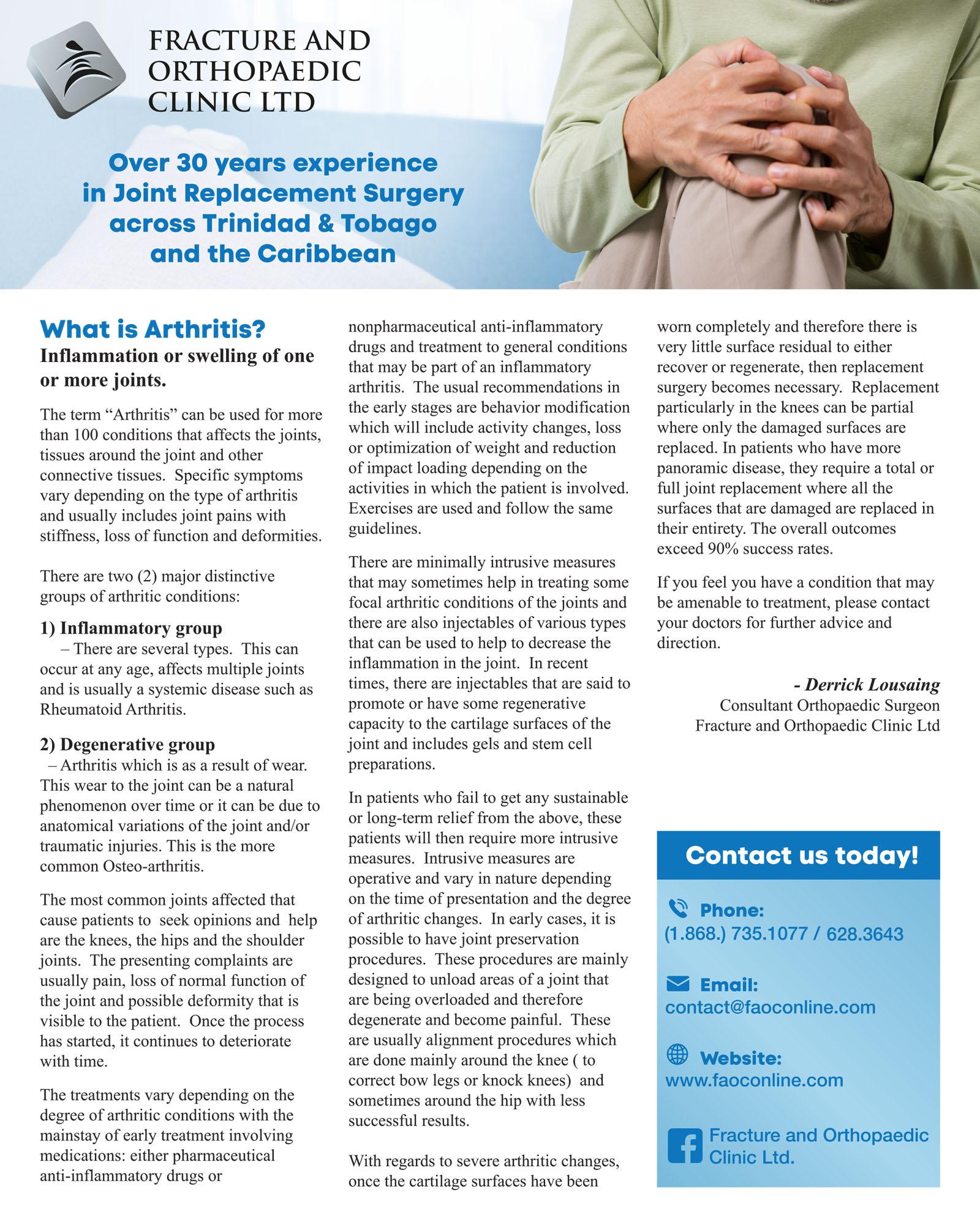

THE IDEA OF LOSING WEIGHT WHILE BUILDING MUSCLE SOUNDS CHALLENGING. IT’S NEARLY PARADOXICAL TO BURN FAT WHILE GAINING MUSCLE, BUT WHAT IF WE TOLD YOU IT WAS POSSIBLE? YOU’LL PROBABLY SAY, ‘SIGN ME UP,’ BECAUSE WHO WOULDN’T WANT TO MEET THEIR GOAL IN HALF THE TIME? WE’RE HERE TO SHARE THE GOOD NEWS. YOU CAN DO IT. THIS PROCESS IS KNOWN AS “BODY RECOMPOSITION” IN THE WORLD OF HEALTH AND FITNESS.




WHILE BURNING

 WRITTEN BY CHRISTOPHER RYDE
WRITTEN BY CHRISTOPHER RYDE


FITNESS | LOSING WEIGHT WHILE BUILDING MUSCLE
18 | u
LET’S BREAK IT DOWN FOR YOU.
HOW DOES OUR BODY BURN FAT?
When our body is introduced to a new lifestyle change, our brain sends signals to our fat cells that cause us to burn fat. These signals can be triggered by a change in our diet or a new addition to our exercise regimen. Our brain instructs our fat cells to function differently in one of two ways; by utilizing the energy stored within the fat cells to perform tasks or by lessening the number of fat cells the body stores. When either or both begin, we enter the fat loss stage of fitness.
HOW DOES OUR BODY BURN FAT?
When our body is introduced to a new lifestyle change, our brain sends signals to our fat cells that cause us to burn fat. These signals can be triggered by a change in our diet or a new addition to our exercise regimen. Our brain instructs our fat cells to function differently in one of two ways; by utilizing the energy stored within the fat cells to perform tasks or by lessening the number of fat cells the body stores. When either or both begin, we enter the fat loss stage of fitness.
HOW DOES OUR BODY BUILD MUSCLE?
Muscles in our body begin to grow with exercise. When we work out efficiently, our muscles incur micro tears that stimulate muscle repair. As our body repairs, our fibers experience muscle hypertrophy, in other words, muscle growth.
A GUIDE TO BURNING FAT AND BUILDING MUSCLE SIMULTANEOUSLY.
For both diet and exercise, we must follow a few steps:
DIET
To trigger those fat-burning brain signals, we need to reduce our calorie intake. This doesn’t simply mean that we should eat less. Instead, the aim is to ingest fewer calories than we burn in one day. When we do this, our body can employ our stored fat cells for energy which gets us to that fat-burning stage.
A DIET FOR WEIGHT LOSS:
There are so many trending diets; how do you choose?
Well, the good thing about caloric deficit is that you have the freedom to choose a diet that fits your lifestyle. If your goal is to lose weight, the most important factor of any diet is maintaining the balance between what you intake and what you utilize. Here are some quick tips on how to decrease your caloric intake:
- START BY TRACKING YOUR CALORIES – a good place to start is knowing how many calories you intake and use in a day. To measure the number of calories you burn, invest in a smart device, such as a smartwatch, that conveniently calculates your daily calorie usage. To measure the calories, you intake, invest in a food scale that converts what we eat into calories. This step is crucial as we can easily underestimate just how many calories one donut has.

- CUT DOWN ON SUGAR – sugar quickly runs up our calories and can be easy to consume. Get in the practice of checking your drinks and snacks for their sugar content, and try avoiding too many sugary treats.
- SWAP YOUR SNACKS – a lot of snacks are known to be calorie dense which means that a tiny bar of chocolate can equate to an entire meal worth of calories. Instead of purchasing snacks with high calories, try your hand at a few recipes that allow you to alter your ingredients to suit your diet.
- CONTROL YOUR PORTIONS – if you’re someone who often skips meals and ‘makes up for it later, get in the habit of portion control. This means eating on time and managing your portions. We don’t disagree with a few sessions of binge eating, but perhaps we can leave those for cheat day.
EXERCISE
Working out is equally important for body recomposition as it increases the number of calories we burn daily and prompts muscle growth. The key to simultaneously burning fat and building muscle requires two specific types of workouts.
1. CARDIOVASCULAR (CV) TRAINING – cardiovascular workouts use our body’s stored fat and carbohydrates for energy, therefore, burning fat. These aerobic exercises include running, jogging, swimming, walking,dancing, cycling, hiking, et cetera. Think of exercises that increase your heart rate. If you’re new to CV training, start with 20 minutes per day and gradually increase your sessions to suit your adaptability.
2. RESISTANCE TRAINING – this replaces the fat your bodyburnt from cardiovascular training with muscle. Alsoknown as weight training, this method increases yourmuscle growth by adding force to your workouts withthe use of weights. Typical resistance training sessionsinvolve dumbbells, barbells, medicine balls, et cetera. If you don’t have access to any training tools, experiment with your body weight. Start with exercises such as squats, planks, leg lifts, pushups, et cetera.
CONCLUSION
The bottom line is that we can achieve that body we want with commitment and discipline. So, let’s summarize the rules for body recomposition:
1. To burn fat, lower your calorie intake and practice cardiovascular training.
2. To build muscle, increase your protein intake and practice resistance training.
In combination, those steps can get you closer to meeting your fitness goal. Remember, choose diets and exercises that are enjoyable to you, and be patient with your body. Progression takes time. Create a schedule to help you stay on track, and don’t overdo it.
LOSING WEIGHT WHILE BUILDING MUSCLE | FITNESS 19 | u
Am I Hungry?








 WRITTEN BY SARAH MURPHY
WRITTEN BY SARAH MURPHY


HUNGER. HOW CAN WE EXPLAIN HUNGER? IT CAN BE QUITE A CONFUSING FEELING. SOMETIMES WE’RE UNIMAGINABLY HUNGRY; WE COULD EAT A MEAL AS LARGE AS A HORSE. OTHER TIMES, THE DAY CAN PASS BY WITHOUT EXPERIENCING AN OUNCE OF HUNGER. A LOT OF FACTORS CONTRIBUTE TO OUR VARYING LEVELS OF HUNGER. IN THIS ARTICLE, WE’RE GOING TO FOCUS ON THE ROLE OF HORMONES AS THEY RELATE TO THE FEELING OF HUNGER.

DIET | EXPLAINING HUNGER |
What are hormones?
Hormones are chemical messengers that exist throughout our bodies to keep us alive. They travel through our bloodstream to our organs, skin, muscles, and tissues, delivering messages that communicate with our body to provide instructions on what to do. So far, research has identified over fifty hormones, all contributing to different bodily processes. For example, hormones trigger responses to growth, development, sex, reproduction, mood, sleep, metabolism, blood sugar, blood pressure, and, yes, you guessed it, feelings of hunger.

The Endocrine System
Your hormones derive from glands located in your endocrine system. These glands are located throughout the body and are responsible for the production and secretion of your hormones. The endocrine system is made up of the pituitary, hypothalamus, thyroid, parathyroid, adrenal gland, pineal gland, pancreas, ovaries, and testes. Glands such as our hypothalamus and pituitary monitor levels of hormones in our bloodstream and signal our body to produce hormones. Think of this mechanism as a lock and key. When our body recognizes that we need more of a hormone, one of our glands releases a hormone that communicates with another gland to produce and release another hormone.
Now that you have an understanding of how the endocrine system works, let’s talk about “hunger hormones.” Hunger hormones refer to two dynamic chemicals that control when we feel hungry.
Leptin – made by fat cells; this hormone is known as an appetite suppressor. This simply means that the presence of leptin in our body decreases our appetite. Its primary purpose is to manage our food intake and the use of energy. Leptin prevents the feeling of hunger which triggers our body to use an existing source of fuel to provide energy for tasks. Without leptin or a lack of leptin prompts a hunger response when our body experiences low energy levels or is tasked with a form of labor.
LEPTIN AND WEIGHT: As you might have experienced, the hungrier we are, the more likely it is that we indulge in a meal or snack, and the more likely it is that we gain weight. When leptin kicks in, our brain sends signals instructing us to stop eating after we’ve had enough, preventing overeating and, therefore, excessive weight gain. However, during weight loss, the body produces less leptin as a result of decreased fat cells, causing our bodies to stimulate intense hunger. This can explain why as we begin to lose weight, we develop more significant cravings and might sometimes eat more.
LEPTIN RESISTANCE: Leptin resistance occurs when our bodies override the amount of leptin present, increasing the

likelihood of overeating and weight gain. Leptin resistance is common in obese people and can increase when we consume foods with high levels of sugars and fats.
Ghrelin – produced in your gut, this hormone is considered an appetite stimulant. Ghrelin, or lenomorelin, signals our brain to eat. This is what makes us hungry. The primary purpose of ghrelin is to increase our appetite so that we intake more calories and store fat for energy. When our body senses that the stomach is empty, it initiates the release of ghrelin.
GHRELIN AND WEIGHT: The more ghrelin in our bodies, the hungrier we become. It plays an important role in preventing us from undereating and maintaining a healthy amount of body fat. Research suggests that obese people do not necessarily have more ghrelin in their bloodstream but might just be more reactive to the hormone. Furthermore, suppose you begin feeling hungry at the onset of a diet. In that case, it’s probably your body kicking into survival mode by increasing the release of ghrelin to prevent you from starvation.
Controlling your hunger hormones.
The idea of controlling hormones seems enticing because that means we can control our weight gain or loss journey, making our lives much easier. Unfortunately, this is easier imagined than done. Because glands produce our hunger hormones in our endocrine system, there’s very little that we can do to control them. For instance, our diet won’t have an impact on our hunger hormones. However, because leptin is produced in the white adipose tissue of the body, the less fat we have, the less leptin is produced, and vice versa. Ghrelin is similar to leptin in that there are very few ways to control our levels. Still, scientists suggest that if we maintain a proper sleep schedule, increase muscle mass and prioritize sleep, we can maintain a healthy level of that hormone. Hormonal imbalances can contribute to many health issues. For example, doctors associate the imbalances of hunger hormones with diabetes, anorexia nervosa, celiac disease, inflammatory bowel disease, gastritis, obesity, and more.
Hormones play a significant role in our bodies. There are many common hormonal imbalances that occur throughout our bodies that trigger unfavorable responses. The key is to stay aligned with your health. Do not hesitate to chat with your healthcare provider about any health and hormone issues you might be experiencing. There are blood tests that your physician can conduct to narrow out your diagnosis. Our bodies are extremely sensitive and, in some cases, hyperactive to certain hormones. Your hunger hormones are arguably some of the most important. They tell us when to eat and when to stop eating. Stay educated about your body and all its components. The more we understand ourselves and our health, the better we can cater to it.
EXPLAINING HUNGER | DIET 21 | u
Beachy Benefits

BENEFITS OF THE BEACH LIME
In the Caribbean, with Trinidad and Tobago at the absolute top of the list, beach limes are an essential part of life and living on an island. It's a part of our culture to pack up a car and cooler and head out to one of the beautiful beaches to have a lovely lime. (Lime or Liming, not an actual culinary term but, in fact, an activity in Trinidad and Tobago – refers to the art of doing nothing while sharing food, drink, conversation, and laughter. Liming is an integral part of the country's island culture).
It's how we connect with not only nature but people, we know that we can de-stress and relax at the beach. We enjoy the simple pleasures of the fresh air and sea breeze, watching cricket or football games on the sand, and even the sound of the ocean. It transports us to a different level of calm, but many of us don't know how the beach or ocean water can improve our health and well-being.
Vitamin Sea SKIN
Sea water is packed with goodness for your skin, containing minerals like sodium, magnesium, calcium, and chloride sulfate that all work as natural cosmetics for your skin. The word 'Thalassa" is Greek for the ocean, and the therapy dates back to ancient times when Egyptians practiced healing using ocean water to improve overall health. In addition, magnesium-rich seawater promotes moisture retention in the skin leaving the skin fresh and vibrant.
For Caribbean people, the phrase, "a sea bath would fix your skin" is well known; and research today proves that statement quite true. Seawater has proven to help people with atopic skin conditions, including psoriasis and eczema, as its anti-inflammatory properties can also speed up the healing process.
CIRCULATION AND IMMUNE SYSTEM
Factors in our daily lives, including poor diets, may lead to the loss of essential microelements, and thalassotherapy is also known to improve blood cycle and circulation by restoring them.
As far as strengthening the immune system goes, seawater contains abundant minerals, vitamins, amino acids, and micro-organisms, all known to have antibacterial properties that work as natural antibiotics. These components can be absorbed into the skin when swimming and even inhaling sea mist. Additionally, soaking in cold sea water can boost the production of white blood cells, which is essential to fighting infection.
OVERALL WELLBEING
Sea swimming is known to improve health and wellness. Not only the calming sensation of the cool water and the abundance of Vitamin D from the sunshine but the ocean has also been linked to stimulating the parasympathetic system, which is responsible for rest and repair and can trigger the release of dopamine and serotonin, all vital parts of keeping us happy.
Now, if some of this information doesn't convince you enough of the benefits of a sea bath, then go back to some of the words of your grandparents like;
And we know that the older folks always knew what they were talking about when it came to tried and trusted remedies.
So if you're not one to take a dip the next time you are at the beach, give it a try with brief dips at a time until you are really ready to take that plunge!
ECOTHERAPY | BEACHY BENEFITS 22 | u
WRITTEN BY STAFF WRITER
"A dip in the sea will fix that snotty nose."
"Your skin will clear up quick-quick with the seawater."
Ceviche
RECIPE BY STAFF WRITER
Allow us to introduce you to our low-cal snack, ceviche. Enjoy it on its own, with crackers, or on some nicely buttered toast. However you choose to have it, you’ll become obsessed, but not to worry because it’s high in macronutrients and protein.

YIELDS:
4-6 servings
INGREDIENTS:



1lb peeled and deveined shrimp
½ cup lime juice
2 tomatoes (diced)
1 cucumber
½ red onion




½ cup cilantro
1 teaspoon black pepper
1 teaspoon paprika
Salt (to taste)
INSTRUCTIONS:
1. Combine the shrimp and lime juice into one bowl and allow to soak in the refrigerator for one hour.
2. Dice all other ingredients and strain the shrimp, saving the liquid.
3. Combine all ingredients in one bowl, adding black pepper, paprika and salt to taste.
4. Add half of the reserved liquid from the shrimp.
5. Serve and enjoy.
CEVICHE | RECIPE 23 | u
WHAT ARE BLUE TEETH?
Blue teeth can be a cause for concern. While some of us have naturally tinted teeth that appear pink, yellow, or grey, blue teeth can sometimes suggest dead teeth. Blue teeth imply that the nerves and pulp within the tooth may have died, hence dead teeth. It can also indicate dental trauma, oral health issues, or simply a result of a cosmetic problem.
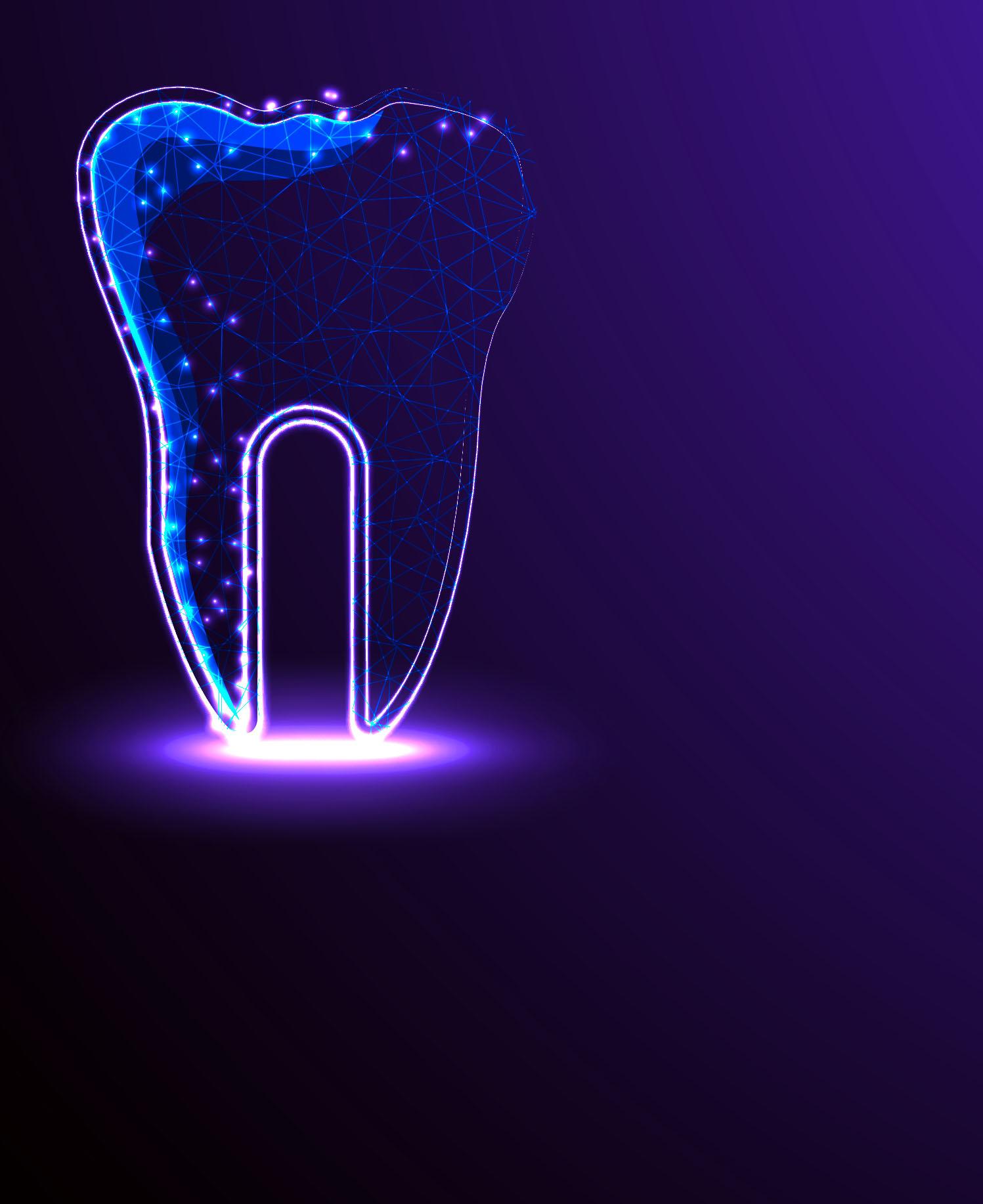
WHAT CAUSES BLUE TEETH?
Blue teeth have many causes ranging from trauma to infection. Here are some common causes of blue teeth:
• It can happen naturally! – Our teeth come in varying shades and colors, and some of us develop a rare genetic disorder called “dentinogenesis imperfecta.” This inherited condition forms weaker teeth that are usually blue-gray in color.
What’s my teeth saying?
WRITTEN BY VINCE ASHER





• Getting older – Many physical changes come with aging, and your teeth are often not excluded. As we age, our teeth’s enamel erodes, causing either a yellow or blue color change in our teeth.
• Oral Damage – injuries near the tooth or gum can interrupt the blood flow to the tissue beneath your teeth, causing discoloration. It is possible for your tooth to heal and return to its normal color, but in some instances, it may remain blue.
• Antibiotic Exposure – reports indicate that early exposure to infection-fighting antibiotics in the womb or as an infant can cause permanent bluish discoloration in adulthood.















24 | u DENTAL | BLUE TEETH
• Dead Teeth – despite the concept that teeth themselves are lifeless, beneath your healthy tooth are nerves and pulp. Once either of those has died, your teeth will change to a blue-gray color.
• Dental Repairs – while dental restorations and procedures are designed to fix existing oral issues, some may result in tooth discoloration. Substances used in dental repairs, such as amalgam, porcelain, ionomer, et cetera, age and can begin to peek through your teeth’s enamel surface.
• Infections – diseases occurring in the gums or beneath the teeth can also cause discoloration.
ARE BLUE TEETH DEAD TEETH?

While blue teeth can indicate dead teeth, this is not always the case. Blue teeth have many causes, so do not panic. Instead, consult with your dentist to determine the source of your discoloration. It can be a cosmetic imperfection or a result of trauma. Your dentist will conduct the necessary examinations before diagnosis.
CAN MOUTHWASH TURN YOUR TEETH BLUE?
Some mouthwashes can potentially stain your teeth. This is known as an extrinsic stain caused by dyes and colorings in some mouth rinses. Experts suggest that it is more likely to observe a bluish hue if there is something for the dyes to stick to, i.e., plaque. The more you get rid of plaque build-up on your teeth, the less likely dyes will attach it. However, it is important to note that even with proper oral hygiene, some rinses, particularly Chlorhexidine Gluconate, are known to cause discoloration. Properly research the ingredients in your mouth, rinse and try to select organic products.
CAN BACTERIA TURN YOUR TEETH BLUE?
Bacteria can impact the color of your teeth. Bacteria makes you prone to gum disease, which can result in infections and damage to your nerves and the pulp beneath your tooth. Both can affect the overall health of your tooth, making it likelier to become discolored. In addition, the more bacteria linger in our mouths, the easier our teeth become stained from dyes in oral hygiene products, such as mouth rinses. Excessive bacteria, in any instance, are dangerous for the maintenance of proper hygiene and health.
HOW TO FIX BLUE TEETH?
Dental professionals have devised a few plans to combat blue teeth. Here are some:
• Whitening Treatments – whitening treatments, including gels, strips, laser, and bleaching treatments, can be used either in the office or at home to help reduce the bluish appearance. This treatment option is the simplest and most cost friendly but may not work for all cases of blue teeth.
• Crowns – dental crowns are tooth-shaped caps that professionals place over your damaged teeth. This option completely hides your blue teeth and is entirely safe. Some crowns are made of ceramic, porcelain, stainless steel, or resin. Apart from hiding the blue teeth, crowns provide renewed strength to your tooth and prevent further decay of your natural tooth. Well-maintained dental crowns typically last up to 15 years and do not require any special care.
• Veneers – these are wafer-thin, custom-made tooth-colored shells that are attached to the front surface of your teeth. Often made of porcelain, these semi-permanent shells hide imperfections. Veneers require a few trips to the dentist for your consultation, fitting, and application. You will be given the option of choosing your shape, size, length, and shade. Veneers might be the way to go if you’re looking for the most customizable option.
• Root Canal – if your blue teeth result from dead nerves and tissue, your dentist might recommend a root canal. A root canal removes the dead pulp, cleans the infection, and fills the roots with a permanent filling. In some cases, your dentist may recommend getting a crown over the filling, depending on how damaged the tooth is. If not, they may recommend bleaching treatments to help restore the color of your tooth. This treatment option ensures the health of your tooth is prioritized.
The first step in caring for your teeth is practicing proper oral hygiene at home. Secondly, stay up to date with your dental visits. If you have blue teeth, be sure not to panic. Schedule a consultation with your dental professional for a check-up. Blue teeth have varying causes, and yours might not be as bad as dead teeth. However, if they are, rest assured you have treatment options.
BLUE TEETH | DENTAL 25 | u
WHEN FAST PAIN RELIEF IS NEEDED, REACH FORPARACONICA PLUS












Proven effectiveness for acutepain, suchas: headache, menstrual pain & dental pain



































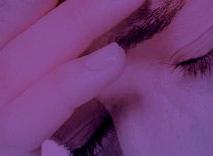









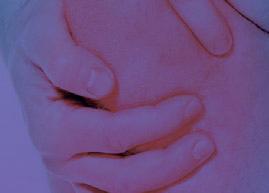

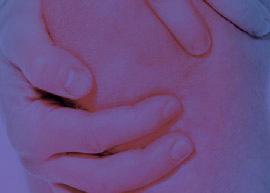
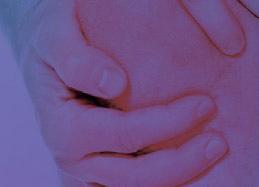

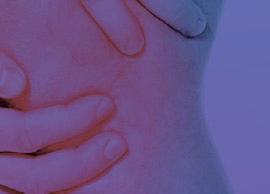







Combinedbenefits of two powerfulingredients










Affordablecombination therapy


















Rapid onset of action











































SUPERIOR & FASTERPAIN RELIEF THAN PARACETAMOL OR IBUPROFEN ALONE



















AVAILABLEAT PHARMACIES NATIONWIDE
U ASK
ANSWERED BY DR. RICHARD LUTCHMAN
Why can’t I sleep?
There are many reasons why a person might experience troubles falling asleep. The most common reasons are usually linked to caffeine, nicotine, or medications. Some people also have a difficult time going to bed if they’re stressed or suffering from a sleeping disorder, such as insomnia. Try practicing proper sleep hygiene and avoid caffeinated drinks and heavy meals right before bed. Journal your sleep habits so you can track your progress and if after some time you are still struggling, reach out to a health care professional for an evaluation and guidance.
What do cancer stages and grades mean?
The stage of a cancer describes the size of a tumor and how far it has spread from where it originated. The grade describes the appearance of the cancerous cells. If you're diagnosed with cancer, you may have more tests to help determine how far it has progressed. Staging and grading the cancer will allow the doctors to determine its size, whether it has spread and the best treatment options.
We always enjoy hearing from you! Email your questions to register@uhealthdigest.com
27 | u
| Q&A
YOU HAVE QUESTIONS, WE HAVE ANSWERS


28 | u ILLNESS | FOOD POISONING
WRITTEN BY DR. RICHARD LUTCHMAN
FROM “MMM, SO GOOD!” TO “AHH, SO BAD!” HAVE YOU EVER EATEN SOMETHING THAT HAD YOUR TASTE BUDS JUMPING FOR JOY ONLY TO BEHIT WITH A NIGHTMARE OF JARRING SYMPTOMS?WHY IS A DELICIOUS MEAL CAUSING DISCOMFORT? NAUSEA, VOMITING, DIARRHEA… UM, YOU MIGHT JUST HAVE FOOD POISONING.
WHAT IS FOOD POISONING?
Food poisoning, a type of foodborne illness happens when we consume spoiled, toxic, or contaminated food. Contaminated foods are usually infected with bacteria, fungus, or a virus whose byproducts result in food poisoning. After consuming something toxic, our body’s natural response is to protect. Unfortunately for us, our body’s version of cleansing and healing itself involves a series of uncomfortable symptoms.
SYMPTOMS OF FOOD POISONING
Food poisoning isn’t one of those illnesses that go easily undetected. More than likely your body will let you know. Symptoms vary from person to person and can occur hours or days after consumption. Here are some common symptoms associated with food poisoning:
- Abdominal cramps
- Nausea
- Vomiting
- Diarrhea
- Loss of appetite
- Fever
- Fatigue

- Headaches
While most symptoms usually last a few days, there are some life-threatening cases of food poisoning that include more severe symptoms such as:
- Diarrhea lasting more than three days
- A fever above 102°F
- Severe dehydration including dry mouth, little to no urination, difficulty keeping fluids down
CAUSES OF FOOD POISONING
Bacteria, toxins, parasites, and viruses; while these pathogens can be found in nearly all the food we eat, heat from the cooking process usually kills and elimates it before we ingest it. It is typical for raw foods to be a common contributor to the development of food poisoning. Studies also demonstrate that meats, eggs, and dairy products are often contaminated.
• BACTERIA – E. coli and salmonella are common causes of food poisoning.
• PARASITES – Parasites such as tapeworms, flatworms and roundworms that spread through foods are very dangerous and cause severe cases of food poisoning.
• VIRUSES – Viruses such as the norovirus, astrovirus, rotavirus, etc., are also known for causing food poisoning.
FOOD POISONING VERSUS A STOMACH FLU
Both food poisoning and a stomach flu are classified as gastrointestinal infections, causing inflammation of the stomach and small intestine. While the symptoms for each infection is similar, the difference is that food poisoning comes from food whereas a stomach flu has many varying contributors.
WHO CAN GET FOOD POISONING?
Anyone! Food poisoning is very common and can affect anyone at any age. Those with a weaker immune system such as pregnant women, children under five, adults over sixty-five and those with chronic illnesses should be extra mindful of the foods they eat. Be sure that your food is fresh, stored at the appropriate temperatures, washed properly, and prepared in a sanitary manner.
DIAGNOSIS
After reaching out to your healthcare provider, they will conduct an analysis of your symptoms and recent food intake. For further confirmation they may request blood and stool samples to check for parasites or bacteria.
TREATMENTS
The most important tip for recovering from food poisoning is to stay hydrated. With the significant loss of liquid from vomiting and diarrhea, your body will require extra fluids to heal. Depending on the severity, your doctor may administer IV fluids. You will also be encouraged to take medications to help cope with your other symptoms, for example antidiarrheal medications, pain killers, fever reducers, and in some cases antibiotics.
Tips to get through food poisoning:
1. Avoid heavy meals.
2. Eat light and soft meals.
3. Try having ice cubes or popsicles for extra hydration.
4. Get lots of rest!
FOOD POISONING CAN BE DISTRESSING BUT THE GOOD NEWS IS THAT MOST OF US RECOVER WITHIN A FEW DAYS WITHOUT MAJOR TREATMENT. SO, BE WISE ABOUT YOUR FOOD CHOICES AND FEAST ON.
FOOD POISONING | ILLNESS 29 | u
The Social Shivers
30 | u
MENTAL HEALTH | SOCIAL ANXIETY
WRITTEN BY ALLY LESTER
“I
MIGHT HAVE SOCIAL WHAT!?”
Social anxiety or social phobia is a common and usually long-term mental disorder that induces excessive stress in social situations. Those struggling with social anxiety experience great fear in most social settings and particularly when interacting with others and meeting new people.
HERE’S HOW YOU’LL KNOW.
Many people experience social anxiety in different ways. Social interaction can trigger varying symptoms; both physical and psychological.
Here are some of the most common physical symptoms:
- Excessive sweating
- Trembling or shaking
- Dizziness
- Rapid heart rate
- Nausea
- Stuttering
Some psychological symptoms include:
- Worrying about social situations
- Avoiding social gatherings
- Worrying about embarrassing yourself
- Overthinking simple tasks
- Using alcohol to cope in social settings
WHY DOES IT EXIST?
Researchers have yet to discover one cause for social anxiety, however, current research suggests that social phobias stem from a combination of environmental, biological, and situational factors. Some studies indicate that genetics play a role in the development of social phobias; if a close relative is diagnosed, the likelier you are to experience symptoms. Other studies link social anxiety to a hypersensitive amygdala, the body’s flight-or-fright control system. Some situational contributors include bullying, family conflicts, and abuse (physical and/or emotional).
DO I ACTUALLY HAVE IT?
Anxiety is not an unusual feeling, especially after withstanding COVID-19 but it is important to be diagnosed by a medical professional so you can seek
the appropriate treatments. Your healthcare provider will conduct an evaluation based on your reported symptoms and recommend therapies to help offset the symptoms of social anxiety.
SOCIAL ANXIETY? NO, THANK YOU.
Treatment for social phobias vary for each person based on the symptoms they experience. While many physicians offer medication to combat social anxiety, there are many different therapies that also prove beneficial.
• Cognitive behavioral therapy – this form of therapy helps you to channel negative thoughts and convert them to positive ones utilizing breathing and relaxation techniques.
• Exposure therapy – this version of therapy motivates you to face your fear. It encourages gradual exposure to social situations.
• Group therapy – support groups propose skills and coping mechanisms from people undergoing similar episodes and allow you to practice social skills in a safe environment.
Healthcare providers also recommend getting proper sleep and avoiding caffeine, nicotine and alcohol as those substances perpetuate anxiety.
THE BOTTOM LINE.
Perhaps you or someone you know has social anxiety and while it must be taken seriously for the sake of your mental health and overall quality of life, there are promising treatments for social phobias. Put effort into understanding your triggers and making lifestyle changes to suit your comfort level. Try breaking down challenging scenarios and focus on the present versus hypothetical assumptions of the worse. And remember, the most important step in overcoming any mental illness is reaching out for help If you feel like you may have social anxiety, do not hesitate to reach out to your medical provider. If that seems overwhelming, start with small steps like telling a friend.
SOCIAL ANXIETY | BEHAVIORAL HEALTH 31 | u
You’re sitting in a restaurant for your friend’s birthday and everyone’s having a blast. Drinks galore, an elaborate food spread and music in the background. The room is filled with voices, laughter, and good vibes but for some reason you’re struggling to breathe, your hands are sweating and all you can think about is getting home. This isn’t because you’re not having a good time because you are, but you can’t shake the feeling. If this sounds familiar, then you might just have social anxiety.
A bananais not necessarily a







 WRITTEN BY SHERINE MUNGAL
WRITTEN BY SHERINE MUNGAL





fig





But It doesn’t have the same ring if you say “green bananas and saltfish.”









32 | u
FRUIT | A FIG IS NOT A BANANA
I always wondered why we, in the Caribbean or at least in Trinidad and Tobago, refer to bananas as figs. So I’ve combed the internet looking for any information that would satisfy my ‘need to
Mind you, both are equally delightful in their own right, except one is readily available and even grown here in the Caribbean and the other, well, let’s say we may be lucky to find a jar of jam or a pre-packaged dessert with actual figs.
A fruit or not? - We refer to this as a fruit, but a fig is a syconium (a tiny group of inverted flowers growing inside a pod). The Fig is the edible part of the Ficus Carica, a small flowering plant. Cultivated since ancient times and, while native to the Mediterranean and western Asia, it is now grown as a fruit and ornamental plant. Now while this is not necessarily a Caribbean fruit which means we are deviating from our original ambition to feature a “Caribbean fruit” in each issue, we feel that we have a solid connection to the Fig or at least the word.
The fruit is tear-shaped, 1 - 2 inches long, with a green skin that may ripen toward a beautiful and regal purple or brown color; its’ sweet soft reddish flesh contains numerous crunchy seeds. Figs can be eaten fresh or dried, but since ripe fruit does not transport and keep well, most commercial production is in dried and processed forms like jams, rolls, biscuits, or desserts.
Here are some other health benefits you can expect when you eat figs.
• Can reduce high blood pressure
• Improves digestion
• Increase bone density
The Real Fig Let’s
Figs have been associated with health and prosperity for centuries, and before sugar became popular, they were used as a sweetener. Today, it’s making a comeback as a healthier alternative to refined sugar.
Figs are a potassium-rich food and can help correct imbalance. It can also flush excess sodium in your body because of its high fiber levels. In addition, they are an excellent source of prebiotics that improve overall gut health.
Figs are an excellent source of:
• Vitamin A
• Vitamin C
• Calcium
• Iron



• Potassium
• Magnesium
Although figs are healthy in moderation, the sugars in figs can add up quickly, so it is recommended to be mindful of the amount you consume to keep your overall sugar intake low.
So there you have it, the fig! As for what we call figs here in the West Indies, well, it’s pretty much a type of banana, and I learned that they are ‘cooking bananas,’ which is also referred to as fig or green fig, typically used for cooking in its green stage but can also be eaten when it’s ri pe. So whatever you call it, each has a unique taste profile with similar nutritional properties and incredible health benefits.
So, whether it’s a fig enjoyed as a fruit or used for decadent sweet desserts, or a cooking fig for those delicious traditional Caribbean dishes like green Fig and saltfish, they both bring pleasure to our palate in different ways.
A FIG IS NOT A BANANA | FRUIT 33 | u
talk about it.
know,’ and truth be told, not very convinced.



Health Boosting Wellness Shots
 RECIPE BY STAFF WRITER
RECIPE BY STAFF WRITER
An immune-boosting wellness shot to get you in gear for all that this new year has in store for you!? Yes, please! It’s vegan, paleo and gluten free; consider it the quick cheat to an anti-inflammatory vitamin-rich serving.
YIELDS:
7 servings
INGREDIENTS:
2 large oranges
½ pineapple
2 lemons
¼ cup turmeric
¼ cup fresh ginger
½ teaspoon black pepper
INSTRUCTIONS:
1. Peel your oranges, pineapple, lemons, turmeric, and ginger.
2. Add to your juicer.
3. Mix in black pepper to completed juice and stir.
4. Store in tiny bottles for individual servings or a mason jar.
5. Shot one per day in the morning.
HEALTH BOOSTING WELLNESS SHOTS | RECIPE 35 | u























TIME | MAKE THE MINUTES COUNT 36 | u
WRITTEN BY BRANDON PEREIRA
WE’RE GETTING OLDER, WE’RE REMEMBERING LESS, BIRTHDAYS AND ANNIVERSARIES KEEP COMING AND GOING. BUT WHY SO FAST? IT FEELS AS THOUGH THE OLDER WE GET, THE MORE WE SHOULD BE ABLE TO RETAIN/REMEMBER.

STUDIES SHOW THAT AS WE GET OLDER, IT SEEMS AS THOUGH TIME GOES BY “FASTER”. IS THIS TRUE? NOT ENTIRELY. LET’S GET INTO IT.
THE SCIENTIFIC EXPLANATION
In a paper published in 2020, Professor Adrian Bejan argued that as we age, the rate that we process and retain visual information slows down, causing time to “speed up”. As we age, he argues, the size and complexity of the networks of neurons in our brains increases – electrical signals must traverse greater distances and thus signal processing takes more time. Furthermore, ageing causes our nerves to accumulate damage that provides resistance to the flow of electric signals, further slowing processing time. Focusing on visual perception, Bejan proposed that slower processing times result in us perceiving fewer ‘frames-per-second’ therefore more real time passes between the perception of each new mental image. This is what leads to time passing more rapidly. When we are young, each second of actual time is packed with many more mental images.
Like a slow-motion camera that captures thousands of images per second, time appears to pass more slowly. People are often amazed by how much they can recall from their past when they were much younger, but it is not because the memories that were made were deeper or more meaningful, it is simply because our signal processing is in hyperdrive between the age of three up until our early 60’s where
our processing ability starts to decline. “ The human mind senses time changing when the perceived images change,” said Bejan. The present is different from the past because the mental viewing has changed, not because somebody's clock rings. Days seemed to last longer in your youth because the young mind receives more images in one day than the same mind at an older age.
MAKING THE MOST OF TIME!
It is important to keep a schedule as we age to make sure we are getting things done without slipping up. Writing things down even helps young people keep track of what they are supposed to do, not just the oldies. Being physically active increases blood flow throughout the body, keeping the memory sharp. Staying sharp mentally is just as important as being sharp physically. Reading, doing crossword puzzles, playing games all keep our brain active and strays it from being stagnant. Staying organized is also a key part of keeping your memory sharp. Keep track of things in a journal, calendar, or some sort of planner. Keep to-do-lists up to date. Check off items you have completed. A healthy diet is good for your brain. Eat fruits, vegetables, and whole grains. Choose low-fat protein sources, such as fish, beans, and skinless poultry. What you drink also counts. Too much alcohol can lead to confusion and memory loss, so as you get older, try to stay away from the strong stuff.
Get enough sleep; this needs to be stressed because many of us take it for granted! Imagine doing everything in the book to help sharpen your mind, but you don’t get enough rest at night. It will never work! Of course, everyone has different needs, but getting between seven and eight hours of rest per day is key to staying sharp and ensuring that time does not just “fly by”.
THE BOTTOM LINE.
While it may seem as if time is slipping by us as we age, that’s not actually the case. Your biggest takeaway from this article should encourage us to be mindful of how we spend our time. Make the minutes count. Ensure that you are enjoying what you do and who you’re with. Surround yourself with people who uplift you and keep you smiling. Your time here is valuable, keep track of it.
MAKE THE MINUTES COUNT | TIME 37 | u
1. HAVE A BRAIN-HEALTHY DIET: Researchers discovered that foods that contain healthy fats such as olive oil, fish, and vegetables can lead to the reduction of the risk of dementia by 20%.
2. EXERCISE REGULARLY: A combination of aerobic exercises like, tennis, hiking, or even strength building contributes to your cognitive function.
3. GET ENOUGH SLEEP: Seven to eight hours a night is recommended for the average adult.
4. LEARN A NEW SKILL: Learning a new skill like knitting, how to speak another language is one of the best ways to keep your brain sharp.
5. LEARN TO PLAY AN INSTRUMENT: Whether it’s piano or the saxophone, learning to play an instrument gives your brain greater plasticity, which is the brain’s ability to adapt to changes and take on new tasks.
6. DON’T OVERUSE PRESCRIPTION DRUGS: It’s no surprise that illicit drugs can take a toll on brain functioning, but so can many prescription and over-the-counter medications. A study found that people who regularly use common drugs like Benadryl or Paxil, increased their risk of dementia by 54% with just three years of use. The risk grows as we age, since these substances build up in the body and we don’t process them as quickly.
TIPS TO KEEPING
YO U R B R A I N SHARP
7. LIMIT ALCOHOL INTAKE: Binge drinking can cause blackouts, as well as effects that last after you sober up. Long-term heavy drinking can shrink the brain’s frontal obe, leading to memory problems and impaired thinking.
8. QUIT SMOKING: We usually focus on the damage that smoking does to the lungs, but research shows that smoking causes thinning of the brain’s cortex, the part where memory, language and thinking are processed. This thinning happens with age, but smoking accelerates it.
9. PROTECT YOUR HEAD: Whether it’s from your days as the star quarterback on the college football team, a car accident or taking a tumble on the ski slopes, head injuries can have a devastating effect on brain function. A study found that three years after a concussion, the risk of Alzheimer’s disease increases by more than 40%.
10. USE YOUR SENSES: You recall how certain smells like chocolate-chip cookies baking or orange peels can trigger a vivid memory? That’s because the sense of smell is rooted in the limbic system, the primal part of the brain that also controls taste. Make it a habit to stimulate this part of your brain by constantly seeking out new aromas and tastes.
38 | u
WRITTEN BY STAFF WRITER
1
THE NEXT U
April to June 2023
HEY THERE COUCH POTATO
HOW A SEDENTARY LIFESTYLE IMPACTS OUR HEALTH.
Parents’ guide to ADHD
Learn how to help your kids cope with attention-deficit hyperactivity disorder.
Article submission guidelines
U strives to provide informative, educational articles emphasizing health and lifestyle in the Caribbean. We select articles that will appeal to our Caribbean audience that are uplifting, informative and pertinent to health and wellness.
Policies
U The Caribbean Health Digest retains the right and complete ownership of the articles written and published here. This means that if we publish your work in U, we can also publish in any another publication that we may choose, we will however always give credit to all our writers.
All articles are accepted on speculation. Publication of any article cannot be guaranteed. U reserves the right to edit all copy.
Specifics
All accepted articles will be accompanied by the byline and monetary compensation as set out in our writers’ contract.
Letters to the editor
We encourage Letters to the Editor commenting on recent articles published in our magazine. They are not peer reviewed as such, but are assessed in-house to make sure they are factual and non-inflammatory, etc.
Submit all comments, letters and/or subscription requests to:
U The Caribbean Health Digest, Highway Plaza, Level 2, West Wing
LP #80 Calcutta Settlement Road No. 1, Freeport, Trinidad & Tobago or email us at register@uhealthdigest.com
www.uhealthdigest.com
Advertising.
P: 868-280-3353 + 4536



































 WRITTEN BY CHRISTOPHER RYDE
WRITTEN BY CHRISTOPHER RYDE










 WRITTEN BY SARAH MURPHY
WRITTEN BY SARAH MURPHY


















































































































































































 WRITTEN BY SHERINE MUNGAL
WRITTEN BY SHERINE MUNGAL

























 RECIPE BY STAFF WRITER
RECIPE BY STAFF WRITER























